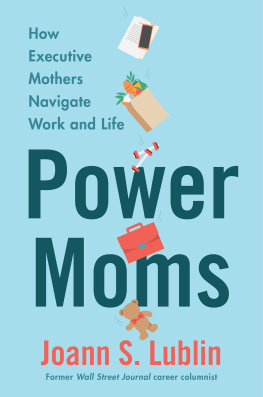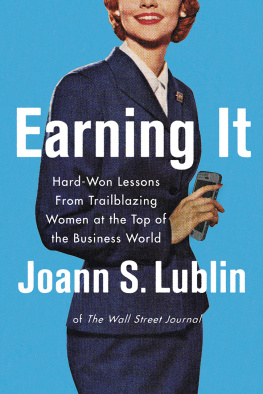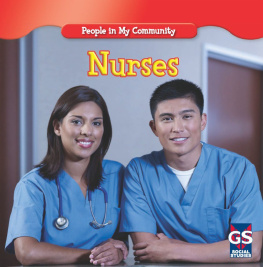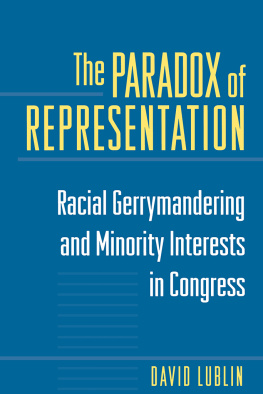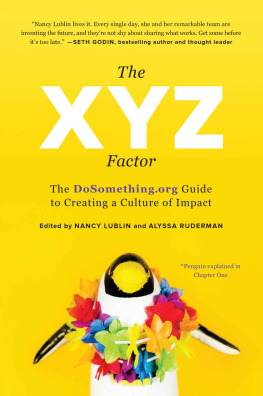Joann S. Lublin - Power Moms
Here you can read online Joann S. Lublin - Power Moms full text of the book (entire story) in english for free. Download pdf and epub, get meaning, cover and reviews about this ebook. year: 2021, publisher: Harper Business, genre: Home and family. Description of the work, (preface) as well as reviews are available. Best literature library LitArk.com created for fans of good reading and offers a wide selection of genres:
Romance novel
Science fiction
Adventure
Detective
Science
History
Home and family
Prose
Art
Politics
Computer
Non-fiction
Religion
Business
Children
Humor
Choose a favorite category and find really read worthwhile books. Enjoy immersion in the world of imagination, feel the emotions of the characters or learn something new for yourself, make an fascinating discovery.
- Book:Power Moms
- Author:
- Publisher:Harper Business
- Genre:
- Year:2021
- Rating:4 / 5
- Favourites:Add to favourites
- Your mark:
- 80
- 1
- 2
- 3
- 4
- 5
Power Moms: summary, description and annotation
We offer to read an annotation, description, summary or preface (depends on what the author of the book "Power Moms" wrote himself). If you haven't found the necessary information about the book — write in the comments, we will try to find it.
Power Moms — read online for free the complete book (whole text) full work
Below is the text of the book, divided by pages. System saving the place of the last page read, allows you to conveniently read the book "Power Moms" online for free, without having to search again every time where you left off. Put a bookmark, and you can go to the page where you finished reading at any time.
Font size:
Interval:
Bookmark:
To my mother, Betty Lublin:
She was always my biggest criticand biggest supporterof my role as a working mom.
In my late thirties, I was a well-regarded reporter for the Wall Street Journal in Washington, DC, when it named me second in command to the female chief of its important London bureau. For the first time, women would run a bureau of the United States premier business newspaper.
I was thrilled about joining management and becoming a pioneer for fellow female journalists. Abra, my four-year-old daughter, was not thrilled.
She and seven-year-old Dan would stay with my parents for two weeks while I arranged child care, schools, and housing in London. On a dark, wintry evening, our kids and their grandmother accompanied me to Washington Dulles International Airport for my overseas flight. I hugged them good-bye at the gate before I walked toward the plane.
Suddenly Abra rushed over and locked herself to my left ankle. I could barely walk. Mommy, dont go! Mommy, dont go! she screamed hysterically. She panicked because she couldnt fathom when she would ever see me again. Guilt filled me. A guilt that many working mothers know well.
I pried Abra loose, then stumbled aboard the aircraft. Tears streamed down my face. Oh, my God, how can I do this? I asked myself between sobs. How can I leave my children with my parents? I worried that my wrenching decision meant I might value my job more than my kids. I felt horribly inadequate as a mother. I also was depressed that I didnt know how I might have handled the situation better.
That painful departure was the low point of a persistent tug-of-war between my commitments to my family and my career. I later advanced to management news editor, inaugurated the Journals career advice column, and shared its 2003 Pulitzer Prize. Abra and Dan are now grown, and hes a married father of three.
My experiences as a working parent gave birth to this book. Reflecting on the years I spent raising children while a highly driven journalist, I wondered whether things have changed much for todays executive mothers.
Do women of the GenX generation tackle the daunting challenges of parenthood any differently than my generation of baby boomers did decades ago? I suspected that GenXers handle the conundrums of work and family better because more of them occupy influential positions and face less social stigma. I decided to explore the unusual world of Power Moms, whom I defined as experienced female business executives with successful careers and children.
I spoke to eighty-six such mothers from the previous generation and the present one. All have worked for sizable U.S. companies in a wide swath of industries such as food, media, technology, financial services, retail, cosmetics, management consulting, and advertising. They divulged heartfelt stories about their illustrious lives.
My yearlong exploration of both generations helped me forgive my own shortcomings as a working mother. Their coping strategies at home and work offer useful guideposts to aspirational women everywherewith or without offspring. Using their playbook, you can flourish both on and off the job.
I discovered a profound cultural shift between the two waves of Power Moms. Amid greater societal acceptance of their dual roles as caregivers and business leaders, contemporary executive mothers pursue ambitious paths that were uncommon only a few decades ago. The risky entrepreneurial ventures launched by many illustrate this change.
Emboldened to pursue their lofty career goals more aggressively, the current crop of Power Moms manages work/life conflicts with far more aplomb and dexterity than I had expected. But I was disappointed to see that they often still lead stressful lives and havent completely overcome working-mother guilt. Its a troublesome sign that America must further improve its treatment of employed parents.
Baby boomers, who were born between 1946 and 1964, were the first wave of mothers to reach the higher echelons of American business. They usually concealed their parenting problems from colleagues because they felt pressured to leave their authentic selves at home. They often lacked female role models, rarely insisted that their spouses be hands-on parents, and enjoyed few family-friendly perquisites. Those trailblazer women were typically in their sixties when we chatted.
I also interviewed twenty-five adult daughters of boomers who shared gripping accounts about their tight though occasionally tense ties with their mothers. Their average age was about thirty years old. Some daughters vowed never to follow in Moms weary footsteps because she had toiled long hours and fought to defy her eras constrictive social norms.
Younger executives make up the second wave of Power Moms. Born between 1974 and 1985, they were under forty-five when I began meeting them in late 2018. Nearly two-thirds are GenXers; the rest are millennials.
Second-wave women navigate working parenthood with less angst because they assertively bring their authentic selves to the office. They benefit from advanced technology, involved husbands, and more supportive employers. Thanks to gutsy breakthroughs by the initial cadre of executive mothers, a number of present ones held important management positions by the time they began their families. Their elite job status and financial resources give them greater control over their work schedules. And they can rely on a growing network of managerial moms like them.
In fact, a significant proportion of women in charge of major U.S. corporations have children. Thats true for 63 percent of the female chief executives at the biggest businesses, including the heads of General Motors, The Hershey Company, Ulta Beauty, and Best Buy. Those nineteen moms were among the thirty women steering companies in the S&P 500 index as of early March 2020, according to Catalyst, a nonprofit organization that conducts research about topics related to women.
Executive mothers also thrive better at work and home now because the overall ranks of senior female leaders have grown. Women held 21 percent of executive suite positions in 2020, concluded a study by McKinsey & Company and Lean In, founded by Sheryl Sandberg, the chief operating officer of Facebook. The management consultancy and nonprofit group tracked womens progress based on data from 317 U.S. and Canadian companies. They separately surveyed more than 40,000 employees about their workplace experiences. The percentage of women at the top rung of the corporate ladder was a marked increase from 17 percent just five years before.
By comparison, women accounted for only about 10 percent of corporate officers in Fortune 500 companies as of 1996, according to a Catalyst census. No comprehensive data exist about the prevalence of mothers in upper levels of business decades ago, however. In 2013, a majority of roughly twenty thousand members of the National Association for Female Executives reported having children, according to a survey by the professional group.
Corie Barry epitomizes the way second-wave Power Moms reap career gains based on breakthroughs and sponsorship by the first wave. The mother of an eight-year-old daughter and twelve-year-old son turned forty-four the same week in April 2019 that Best Buy announced her imminent ascension to CEO.
Barry had been one of three mothers on the top executive team at the electronics retailer. She had won her elevated status by progressing from an initial position of financial analyst two decades earlier. Barry had been promoted to finance chief in 2016. Her female predecessor actively sponsored her for the prestigious position.
Theres another sharp distinction between present and previous generations of executive mothers: the contemporary cohort practices the new concept of work/life sway. They deliberately move back and forth between the professional and personal sides of their digital-centric lives, accepting inevitable and aggravating disruptions such as taking their youngsters to medical checkups during the workday.
Font size:
Interval:
Bookmark:
Similar books «Power Moms»
Look at similar books to Power Moms. We have selected literature similar in name and meaning in the hope of providing readers with more options to find new, interesting, not yet read works.
Discussion, reviews of the book Power Moms and just readers' own opinions. Leave your comments, write what you think about the work, its meaning or the main characters. Specify what exactly you liked and what you didn't like, and why you think so.

